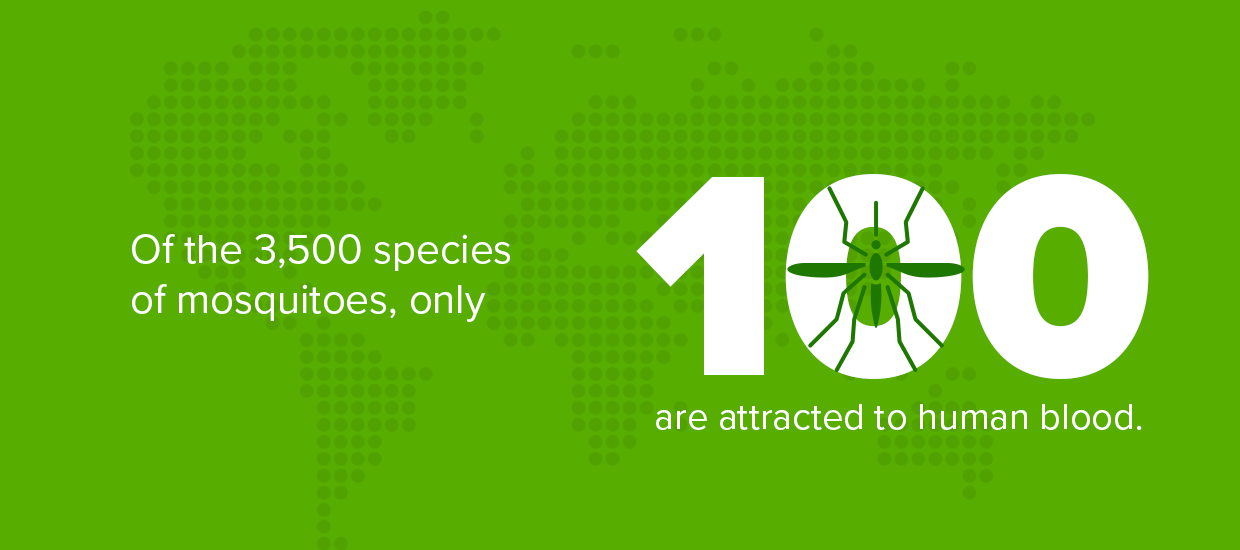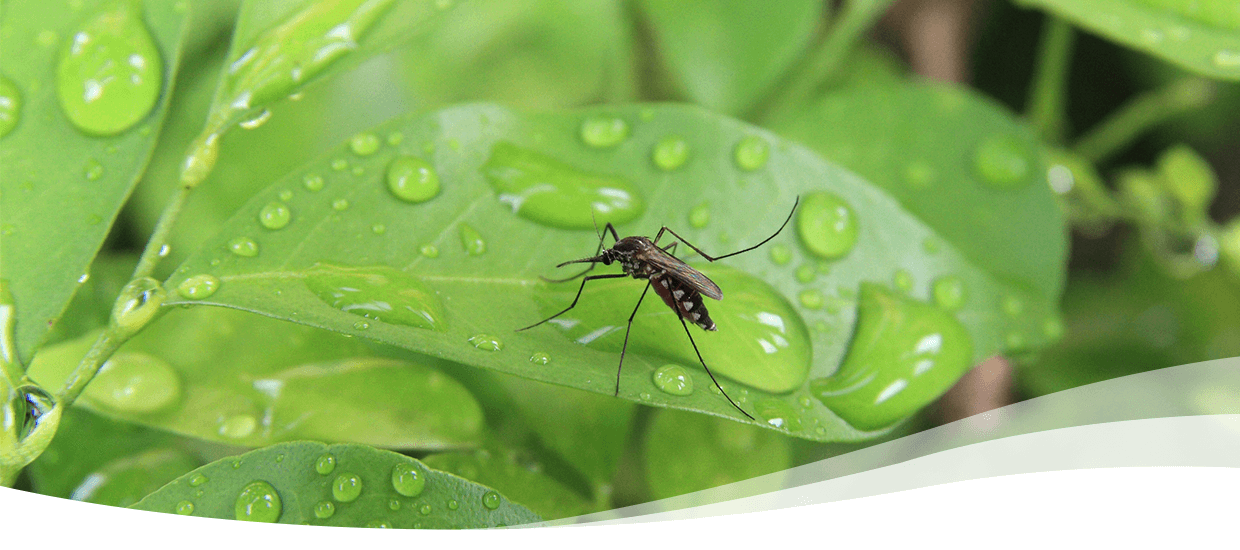Imagine this. It’s summer. You spend the day by the lake, and not once do you have to swat at a mosquito. You return home and host a barbecue, and nobody leaves with itchy, red welts. You sleep that night with the windows open, secure in the knowledge that there will be no buzzing mosquitos on the hunt for your blood.
This would be a dream come true for those accustomed to fighting off mosquitos. And for millions of people who are infected by diseases mosquitos carry, a world without mosquitos would literally be life-changing and life-saving.
Mosquitos kill more people than any other species in the world, and half of the global population is at risk of contracting a disease from a simple mosquito bite. More than a million people die every year from malaria, dengue fever, yellow fever and other mosquito-borne diseases. And it’s not just humans. Livestock and other animals are infected, too.
It’s safe to say that the world would be a better and safer place without mosquitos to worry about. But what would happen if the most hated insect in the world was eradicated from the face of the Earth?
Mosquitos as Vectors
Eradicating mosquitos would provide a long-term solution to the life-threatening diseases mosquitos carry, which is certainly a thought-provoking prompt for a call to action, right? The problem isn’t mosquitos, per se. Like other insects, they play a significant role in the ecosystem.
The issue is that mosquitos are vectors — or carriers — with little control over the transmission process. From penetrating the source of the pathogens to the unfortunate victims they pass it on to, they are involuntary hosts who are unaware of the destruction they cause. Interestingly enough, only female mosquitos bite and suck blood, so male mosquitos don’t pose any threat to people.
The germs these female hosts pick up aren’t all harmful. The mosquito must have the capacity to promote its growth for the germ to cultivate internally, and only a percentage of the viable hosts successfully infect their victims. While mosquitos still transmit a high number of diseases, imagine if male mosquitos could also transmit diseases or if every mosquito was able to carry the pathogen. That certainly paints a different picture!
How Do Mosquitos Transmit Diseases?
So, how exactly do mosquitos make us sick? It’s not as clear-cut as you might think. Consider a brief overview of the transmission process:
- The mosquito draws blood containing harmful bacteria from a human or animal. The bacteria often contains a deadly virus or parasite. If the harmful bacteria grows in the mosquito’s body, they can pass it on. If it stays dormant, it won’t do harm. Remember: Not all germs will multiply.
- Inside the mosquito, the bacteria moves from the body to the saliva glands, where it is stored.
- The infected mosquito bites another human or animal, transmitting the virus into their blood through their saliva glands. The human or animal is more prone to get sick if their immune system can not fight the newly transmitted germ.
Disease is more likely to spread in dense populations since the individuals carrying the virus are in close proximity, making it easier for the same mosquito carriers to infect multiple people in that population.
Mosquito-Related Diseases in the US
There are various virus strains carried by certain mosquito species in the United States. The most common and dangerous is the West Nile virus, first identified in New York in 1999. The Centers for Disease Control and Prevention (CDC) claims that 2,800 people died in total between 1999 and 2022 from the West Nile virus. While it is still prevalent in some warmer U.S. climates, far fewer infection cases are reported each year. Although the West Nile virus is still around, other deadly viruses like the Zika virus and the chikungunya virus have not been recorded in the U.S. in years.
Mosquito-related risk in the U.S. is minimal. Malaria was successfully eradicated, and there is hope that the West Nile virus infection rate will dwindle and eventually be eradicated, too.
Hypothetical Mosquito Eradication
The Earth has been home to mosquitos for more than 100 million years, meaning they’ve evolved alongside thousands of species. They play a significant role in many ecosystems, and there are more than 3,500 named species.
Of the 3,500 species of mosquitos, only 100 are attracted to human blood, while most leave humans alone. Many people don’t realize that there are thousands of mosquito species that live completely off of plant and fruit nectar.
Does this mean that removing mosquitos from the planet would leave predators without prey? Would it leave plants without pollinators? In short, yes. However, many scientists believe the niche currently filled by mosquitos would be taken over by other organisms, possibly causing things to go back to normal — or get even better.

Mosquitos Must Serve SOME Purpose. Right?
Indeed, mosquitos do make a big impact on Earth. They affect the behavior of all species, including humans, and they are an abundant — and often easy — food source for insect eaters. They also are a driving force in the evolution of defense mechanisms.
Still, many scientists think their absence would not be missed and that other species would take the place of mosquitos and be less of a nuisance to humans in the process.
Which Animals Would Be Affected?
If mosquitos were eradicated from the planet, hundreds of fish species would need to change their diet. This could be problematic, especially for the mosquitofish, a specialized predator that is extremely adept at killing mosquito larvae. Aquatic entomologist Richard Merritt warns that some fish could even face extinction. Without these fish, the food chain would be disrupted in both directions.
Certain birds, bats, spiders, insects, salamanders, lizards and frogs also eat mosquitos and may struggle without them. However, these animals typically are not completely reliant on mosquitos. With the loss of this supplement in their diet, it’s estimated that these species would simply seek out other insects that would likely be found in larger numbers once mosquitos are gone.
Most species would not starve without mosquitos, and several would thrive if they disappeared.
What About the Insects and Plants That Mosquitos Eat?
But don’t mosquitos help the ecosystem through the things that they eat?
It’s true that larvae eat decaying leaves, microorganisms and organic detritus, but they aren’t the only ones doing the dirty job. Other organisms process detritus, and mosquitos definitely aren’t the most important players in that game.
However, in certain bodies of water, the removal of mosquitos could pose a problem. In eastern North America, mosquito and midge species actually play a vital role. When an insect drowns, midges chew the carcasses while the mosquito larvae step in to feed on the waste products. This produces nutrients that are important for the plants. So, without mosquitos, certain plant species might feel the effects.
Plants may also suffer because mosquitos are pollinators. Only some mosquito species feed on human or animal blood, and even then, it’s only the females who actually suck blood. However, is their pollination crucial to crops? Not really, say leading experts. Mosquitos serve a purpose, but the purpose could be filled by other pollinators.
Has Eradication Been Tested?
So far, a few small eradication tests have been performed with success.
Oxford University scientists genetically modified the males in the species responsible for carrying the Zika virus and dengue fever: the Aedes aegypti species. The intent was to give the males a gene that would stop their offspring from developing properly so that the next generation of mosquitos would be unable to reproduce before they die.
The scientists released these genetically modified mosquitos in a site on the Cayman Islands and found a 96% reduction in mosquitos when compared with other nearby areas. Similar trials have produced similar results.
Sounds great, right? Unfortunately, despite these promising results, these methods wouldn’t be feasible for a total world eradication, as millions of modified mosquitos are required for just a small area.
The Positives of Eradicating Mosquitos
Even though complete eradication is hypothetical, it’s easy to see the positives of eradicating mosquitos from the world.
The quality of life for countries burdened by mosquito-borne diseases would increase dramatically, affecting several areas of life. Children would be healthier, which means they would miss school less often. Public health resources could be diverted to other priority health issues. The burdens on the health systems would be reduced. Countries may be able to recover the loss of gross domestic product malaria is responsible for.
And the amount of lives that would be saved? You simply can’t put a price on that.
The Negatives of Eradicating Mosquitos
Unfortunately, the unknowns of eliminating an entire species are great. Phil Lounibos, an entomologist, warns of the dangers of eliminating pollinators and food sources. He also worries that whatever insects rise up to replace mosquitos could be just as bad as — or worse than — mosquitos. The unknowns are risky. What if the replacement spreads disease quicker and further than mosquitos?
And then there are the rainforests. Mosquitos make it almost impossible for humans to live in tropical rainforests. While concerns about deforestation are valid, mosquitos may have actually slowed the destruction.
And what about the morals and ethics of destroying an entire species?
Alternative Ideas
While many scientists are hard at work determining if eradication is possible, and if it would be appropriate, others are going about the mosquito problem in different ways.
A sensor has been developed that can detect the species of mosquitos. When a person wears the detector, they can be warned and track the disease-bearing mosquitos, potentially managing future outbreaks.
Some scientists are studying what attracts mosquitos to certain body odors, which may give way to even more effective mosquito repellents. Others are aiming to make mosquitos resistant to the parasites that cause dangerous diseases.
Where Do You Stand When It Comes to Mosquito Eradication?
If we had to venture a guess, we would bet that any reader would welcome a real solution for being bitten less often by mosquitos. Luckily, the Barefoot Mosquito is effective, inexpensive and uses a 99% natural solution.
While you can’t get rid of mosquitos across the world, you can make your own home free of mosquitos when you use the Barefoot Mosquito. Give us a call today at 512-400-2008 in Austin or 713-554-9430 in Houston. Or request a free quote online.


